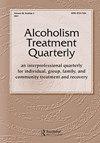父母饮酒有害与非有害家庭中父母沟通对青少年情绪调节的预测作用比较
IF 0.9
Q4 SUBSTANCE ABUSE
引用次数: 0
摘要
摘要情绪调节是青少年通常通过与主要照顾者的早期互动学习的一项重要技能。父母沟通和青少年情绪调节之间的联系有充分的证据,然而,尚不清楚父母的实际沟通行为或青少年对父母行为的感知是否是情绪调节结果的更有力的预测因素。这项研究使用Baumrind的育儿风格类型学作为理论基础,来检验父母制定的反应性和控制力,以及青少年对父母在对话中的反应性与控制力的感知,作为青少年在两次亲子互动中自我报告的情绪调节的竞争预测因素。60名父母-青少年二人组参与了一项基于互动的研究,比较了父母酗酒(n=30)和未酗酒(n=10)的家庭之间的沟通动态。外部观察者对父母的反应和控制进行了亲子互动编码,青少年完成了对父母反应和控制的感知以及互动后他们自己的情绪调节的自我报告测量。结果表明,青少年对父母沟通的感知比观察到的父母沟通行为更能预测青少年的情绪调节。此外,在父母酗酒的家庭中,感知到的父母控制与青少年情绪调节的关系更为密切。本文章由计算机程序翻译,如有差异,请以英文原文为准。
Comparing Enacted and Perceived Parental Communication as Predictors of Adolescents’ Emotion Regulation in Families with Harmful versus Non-Harmful Parental Alcohol Use
ABSTRACT Emotion regulation is an important skill that adolescents typically learn through early interactions with their primary caregivers. Associations between parental communication and adolescent emotion regulation are well-documented however, it is unclear whether the parent’s actual communication behavior or adolescents’ perceptions of the parent’s behavior is a more robust predictor of emotion regulation outcomes. This study used Baumrind’s parenting styles typology as a theoretical foundation for examining parents’ enacted responsiveness and control and adolescents’ perceptions of their parent’s responsiveness and control during conversation as competing predictors of adolescents’ self-reported emotion regulation during two parent-child interactions. Sixty parent-adolescent dyads participated in an interaction-based study comparing communication dynamics between families with (n = 30) and without harmful parental alcohol use (n = 30). Parent-child interactions were coded by outside observers for the presence of parental responsiveness and control and adolescents completed self-report measures of their perceptions of the parent’s responsiveness and control and their own emotion regulation following the interactions. Results indicated that adolescent perceptions of parental communication were stronger predictors of adolescent emotion regulation than the observed parental communication behavior. In addition, perceived parental control was more strongly associated with adolescent emotion regulation in families with harmful parental alcohol use.
求助全文
通过发布文献求助,成功后即可免费获取论文全文。
去求助
来源期刊

Alcoholism Treatment Quarterly
SUBSTANCE ABUSE-
CiteScore
1.60
自引率
11.10%
发文量
31
期刊介绍:
Alcoholism Treatment Quarterly is an exciting professional journal for clinicians working with persons who are alcoholic and their families. Designed to bridge the gap between research journals and information for the general public, it addresses the specific concerns of professional alcoholism counselors, social workers, psychologists, physicians, clergy, nurses, employee assistance professionals, and others who provide direct services to persons who are alcoholic. The journal features articles specifically related to the treatment of alcoholism, highlighting new and innovative approaches to care, describing clinical problems and solutions, and detailing practical, unique approaches to intervention and therapy.
 求助内容:
求助内容: 应助结果提醒方式:
应助结果提醒方式:


